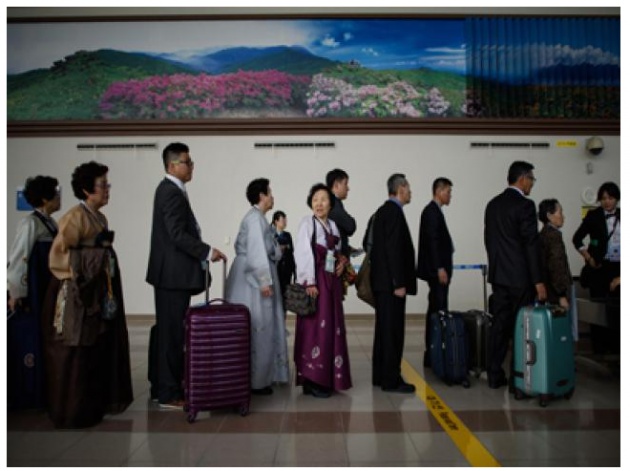
Nearly 400 mostly elderly South Koreans, carrying gifts of warm clothes, cash and cosmetics, crossed into North Korea on Tuesday for a rare meeting with relatives they have either never met or last saw more than six decades ago.
A fleet of buses led by four black sedans flying Red Cross flags carried the family members from a resort in the port city of Sokcho to the heavily-militarised border that has divided the peninsula—and its people—since the 1950-53 Korean War.
After passing through the high-security checkpoint at Goseong, they drove on to North Korea’s Mount Kumgang resort arriving around 1:30pm (0430 GMT), some two hours ahead of the scheduled start of the three-day reunion.
South Korean Red Cross officials wearing bright yellow jackets waved them across the border, holding up banners reading “We are people of one nation”.
The reunion—only the second in the past five years—was organised as part of an agreement the two Koreas reached in August to ease tensions that had pushed them to the brink of armed conflict.
Millions of people were displaced by the sweep of the Korean War, which saw the frontline yo-yo from the south of the Korean peninsula to the northern border with China and back again.
The chaos and devastation separated brothers and sisters, parents and children, husbands and wives.
With more than 65,000 South Koreans currently on the waiting list for a reunion spot, those headed for Mount Kumgang on Tuesday represented a very fortunate minority.
“I couldn’t sleep at all last night,” said 82-year-old Lee Joo-Kuk, sporting a tag with his name, age and the name of the elder brother he will be meeting in Mount Kumgang.
‘Like he’s resurrected’
“Our family was sure he was dead. We even held memorial rituals for him every year,” Lee said.
“But then I got the news that he was alive and wanted to see us. It’s like he’s been resurrected,” he told AFP.
The reunion programme began in earnest after a historic North-South summit in 2000, but the numbers clamouring for a chance to take part have always far outstripped those actually selected.
Among the generation that actually experienced the division of their families, the vast majority died
without ever having any contact with their relatives in the North.
Because the Korean conflict concluded with an armistice rather than a peace treaty, the two Koreas technically remain at war and direct exchanges of letters or telephone calls are prohibited.
The two ambulances following the South Korean buses on Tuesday testified to the advanced age and, in many cases, poor health, of those making the journey.
More than 20 people required wheelchairs for mobility and one woman needed treatment and oxygen Tuesday morning before boarding her bus. Four others dropped out of the trip altogether, saying they felt too unwell.
Kim Ok-Ja, 72 and unable to speak, was going to meet her elder brother who was forcibly recruited into the advancing North Korean army in 1951.
Last chance
“We just assumed he was dead,” said Kim’s husband, who was accompanying her for the reunion.
“Realistically, we know this is the only and last chance we have for a meeting.
“But his parents are buried in his hometown, so we hope that in the future either he or his children will be able to visit there,” he said.
After so many years of waiting, the reunions are cruelly short.
Over the next three days, they will sit down with their North Korean relatives six times.
Each interaction only lasts two hours, meaning a total of just 12 hours to mitigate the trauma of more than six decades of separation.
In a reflection of the stark economic divide between the two Koreas, all the South Korean families had brought gift packages, including winter clothing, watches, cosmetics and—in most cases—several thousand US dollars in cash.
South Korean officials had warned in advance that a substantial slice of any money handed over would be “appropriated” by the authorities in the North.
After the last reunion, in February 2012, some South Koreans complained that their Northern relatives had felt obliged to deliver lengthy political sermons parroting Pyongyang’s official propaganda.



